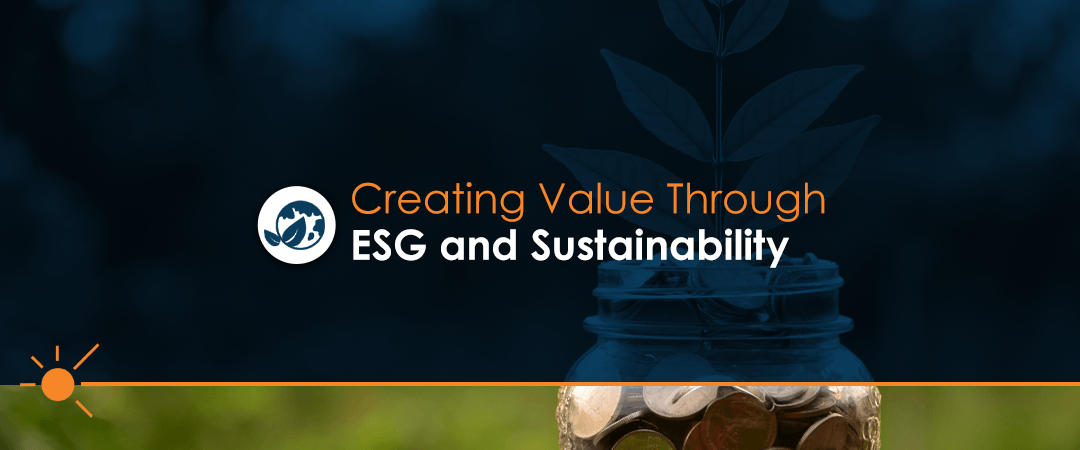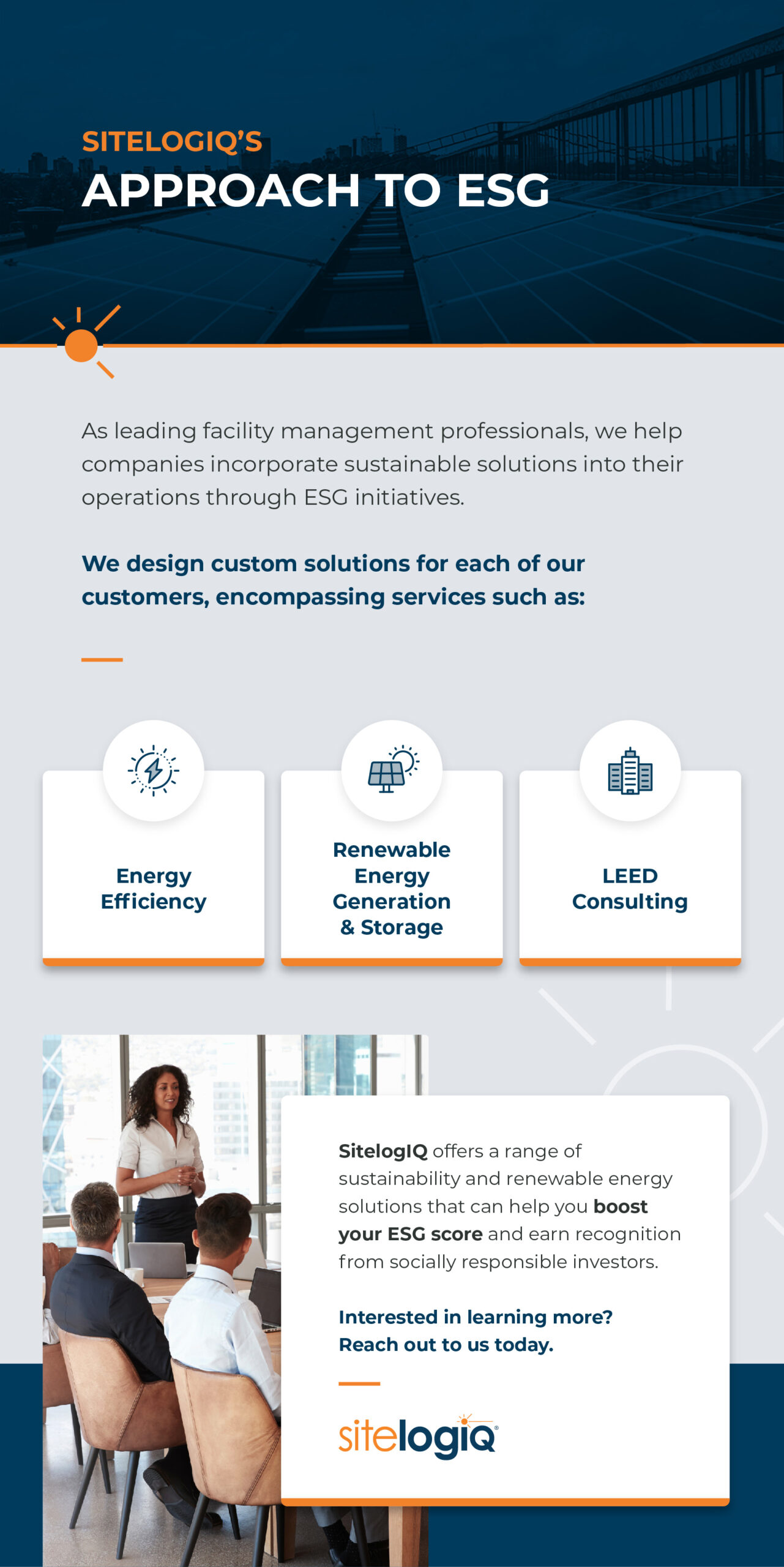
Environmental, Social, and Governance (ESG) strategies are becoming the new normal. It’s leading conversations around business image, transparency, investing, and investor support. Many investors now require an ESG strategy and measure performance through ESG goals. As the idea gains popularity, implementing an ESG strategy for your business is crucial to stay competitive. So what is ESG, and why is it important? We’ve created this guide to help you learn more.
What Is ESG?
ESG stands for Environmental, Social, and Governance. The concept of ESG originated in the investing community, based on the principle that companies that invest in sustainable practices perform better in the stock market. Several data providers calculate and release ESG scores for companies to give sustainably-minded investors a point of comparison. Companies attempt to raise their score through a comprehensive ESG strategy to attract these investors.
An ESG proposition is about the interconnection between environmental, social, and governance issues within your business. Creating an ESG strategy will encompass:
- Environmental criteria: The energy you use and its source both impact the planet. So does the waste you generate and how you dispose of it. The environmental prong of your ESG score also includes carbon emissions and climate change considerations.
- Social criteria: Your company has relationships with the general public and the communities where you do business, affecting your reputation. You develop relationships within your team, while your overall culture and hiring strategy affect labor relationships, diversity, and inclusion.
- Governance: Every company has an internal system of policies and procedures it uses to make decisions, comply with regulations, and meet the needs of investors and external stakeholders. Your ability to govern and enforce your own environmental and social practices is essential for creating real value through sustainability.
Why Is ESG Important to Your Business?
An ESG strategy is quickly becoming a determiner of success. Those who prioritize ESG will gain more opportunities, trust, loyalty, and investment capital. Those who let it fall by the wayside stand to cede competitive advantage. Your ESG proposition is crucial for four reasons:
1. Increased Business Transparency
One crucial benefit of ESG is the transparency it creates between you and your stakeholders. Many companies report sustainability and ESG data directly to their shareholders. The governance aspect of your ESG rating includes tax transparency and taking measures against corruption. When you’re open about your business practices, you build trust with your investors, customers, and employees.
2. Increased Value for Consumers and Employees
The social criteria involved in your ESG initiative create value directly for your employees by ensuring strong labor relationships with your employees, your customers, and your local communities. Companies that prioritize ESG do more, increasing satisfaction for their employees, engagement, and retention along the way.
Meanwhile, both employees and consumers demand companies do their part to act ethically and sustainably. As the Millennial and Gen Z generations take over the labor and consumer markets, companies must fall in line with their priorities. As many as 44% of young professionals would discount an employer with a bad reputation, and 80% say they would prefer working for a company that has a strong reputation for environmental responsibility. Meanwhile, according to Nielson data, sustainable products earn an average of 5% more sales growth per year, while non-sustainable products gain only 2% sales growth.
3. Alignment With Industry Standards
Because of its popularity with investors and the general public placing so much importance on environmental issues, ESG is becoming the standard. According to 2020 research, 70% of institutional investors expect ESG investing to become industry standard within the next five years.
ESG could be a higher priority among your company’s investors than you might think. The average U.S. executive estimates 5% of their shares are owned by firms with sustainable investing strategies, while the actual percentage is 25%. Your industry’s investors dictate your industry standards. As more of your stakeholders adopt an ESG strategy, every aspect of your company, from facilities management to supplier sourcing, will need to account for sustainability.
4. Attract Investors and Partnerships
Sustainable investing is known to produce high returns, and investors know the importance of ESG and sustainability. Companies with high ESG performance are more profitable and have lower volatility. In 2018, investors bought $11.6 trillion worth of stock according to ESG principles, a steep 44% increase from 2016.
Companies who invest in ESG have fewer scandals, more stability, and more management support — three things investors want to see when adding stock to their portfolios. If your company is looking to attract investors, prepare for your ESG performance to act as a yardstick for your business success and potential.
Create Value With ESG and Sustainability
ESG is quickly becoming the standard for businesses across industries. Investors prioritize ESG for a reason — it results in long-term profitability and generates value. How does ESG coincide with long term success? These five key outcomes of an effective ESG strategy result in a high return on investment (ROI):

1. Encourage Top-Line Growth
Sustainability encourages growth in three key ways. First, companies who have a high-ranking ESG score tend to get more trust and opportunities. When governments trust corporations to be sustainable and act responsibly, they get awarded more government contracts. You’ll have an easier time obtaining licenses, access, and approvals needed to expand into new markets.
You can also attract investors with a high ESG score. With more upfront capital at your disposal, you can also gain advantages when entering new markets.
Finally, your end-customers are willing to invest more in sustainable products. Studies show 37% of consumers are willing to pay 5% more for environmentally friendly products.
2. Reduce Costs
Being wasteful with your energy and resources is harmful to the environment and substantially raises your operating costs. Focusing on reducing your energy and water usage results in lower costs. With an ESG strategy, you can create a more efficient operation with the facility upgrades you install. For example, integrating energy-efficient equipment, paired with on-premise energy generation, can significantly lower your energy bill.
3. Minimize Legal Repercussions
When sustainability and social responsibility is an internal goal, companies face less legal pressure and can more easily meet government regulations. When new laws pass, high-scoring ESG companies won’t have to scramble to comply because their practices are already in line or surpassing government expectations. By self-policing your sustainability practices, your industry is less likely to face new regulations. You can even gain support from your government. For example, in the U.S., many states and the federal government offer subsidies or tax breaks for sustainable and inclusive practices.
4. Increase Team Member Productivity
Companies that engage in fair labor practices experience more stability. They face fewer labor strikes and can easily attract high-performing employees to their teams. Many ESG-forward companies prioritize quality labor relations within their team as well as with their suppliers. Doing so can result in better productivity in the form of fewer supply chain disruptions.
The other way an ESG proposition can improve productivity is by inspiring team members. Companies that have a positive mission and give back to the planet and their communities report higher job satisfaction among their employees. One study found that corporate social responsibility is the third-most important driver of employee engagement. When you engage in an ESG strategy, you reinforce project confidence in stakeholders, including your internal team, by showing you are taking the initiative with positive growth.
5. Optimize Expenditures
Implementing an ESG strategy is an investment, not a cost center. Companies that look at their ESG initiative as value generation gain more positive outcomes. Investing in ESG requires a significant cost commitment and creates considerable value over time.
For instance, transitioning to new, more sustainable operations puts your company ahead of the regulatory curve. Future emissions laws will likely place an added burden on carbon-heavy industries. If your company has already substantially reduced its emissions, you can avoid this fallout. You may have a competitive advantage over companies that didn’t invest in ESG today.

SitelogIQ’s Approach to ESG
As leading facilities management professionals, we help companies incorporate sustainable solutions into their operations through ESG initiatives. With a range of energy efficiency solutions, we can help you identify an ESG strategy for your operations. We design custom solutions for each of our clients, encompassing services such as:
Energy Efficiency
Our approach to energy efficiency is comprehensive. We’ll use our EnergyIQ to collect actionable data on your consumption and use it to incorporate energy-saving solutions. We can install more efficient heating, ventilation, and air conditioning (HVAC) systems, commercial lighting systems and insulation to reduce your overall energy consumption.
Renewable Energy Generation
On-site renewable energy generation can save you money while also protecting the planet. When you add solar panels or wind turbines, you’ll be less dependent on the energy grid and reduce your company’s emissions and carbon footprint. Our on-site generation solutions also include battery storage and electric vehicle charging stations.
LEED Consulting
Buildings that achieve Leadership in Energy and Environmental Design (LEED) certification incorporate water conservation, waste reduction, and energy efficiency. Like ESG, LEED requires both environmental and social responsibility alongside robust management involvement. We can manage your LEED certification project for a new build or a retrofit and install some of our environmentally friendly facilities solutions to achieve your desired certification level.
Contact SitelogIQ to Learn More

SitelogIQ offers a range of sustainability and renewable energy solutions that can help you boost your ESG score and earn recognition from socially responsible investors. If you’re interested in our services, reach out to us to learn more and begin discussing your sustainable energy solutions.


